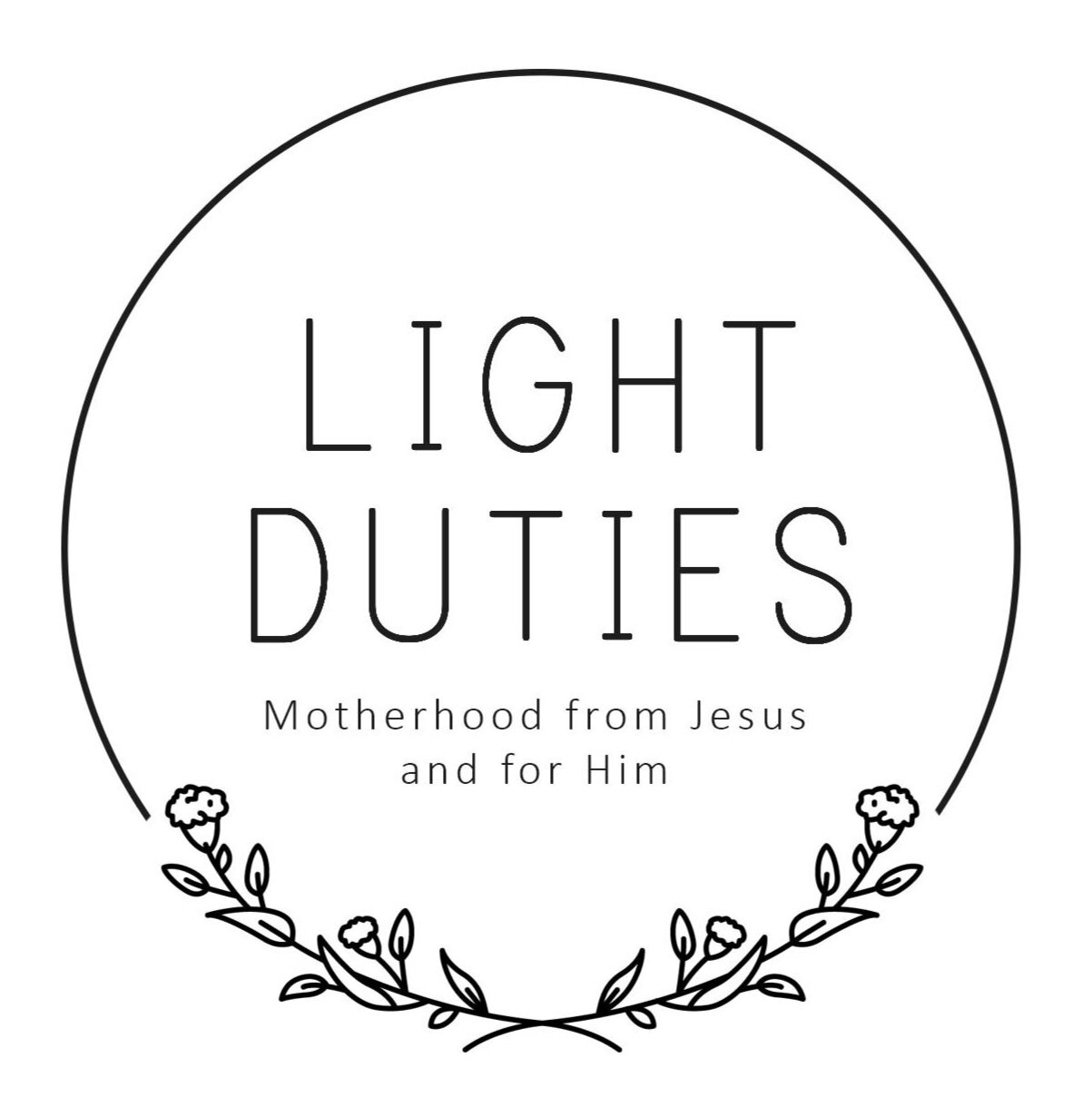
#40. “Go” is Not the Only Verb in the Great Commission
Are home duties a rival to the Great Commission? Will building an overflowing home waste resources that could otherwise be spent telling the world about Jesus? This is the question which troubled me most as I fumbled around in the early years of motherhood. The word that evangelical Christians often focus on is “go”. It’s hard to know what to do with that when so much of raising children is not going. This focus on taking the gospel to new people in new places pickles many of us in guilt, because the time of small children is not full of new people and new places. We’re trying to work out how to be with the same few people in far fewer places than we used to circuit. The slow smallness which goes with invested mothering can look, on the outside, like apathy about Jesus’ mission, or a barrier to it.

Losing our Maternal Bristles {bonus}
The golden law of our society is that whatever a woman is doing, she is Always Only Ever choosing the very best thing. Her holiness is indisputable. Her instincts are infallible. According to a poster on a wall near you, Women are Perfect. This lie is a false comfort. The fact is, when you are struggling to know how to deal with a persistently contrary child, or you don’t know how to fill the hours with your toddler, or you are enslaved to your own volatile temper, you know you are not Always Only Ever choosing the very best thing. No wonder we want to flee motherhood when it keeps exposing us! We need to know what to do with our shame and then we need help. But we often sabotage our own access to help.

#39. Overflowing Home
Home is meant to be the central place from which we worship and train up worshipers. It is naturally the locus of our maternal responsibilities. It won’t be the only place where responsibility and influence happens, but it is the basic place. We can’t leap over it. This is a bland thought if we’ve not known what it’s like to be in a home full of vitality; if we’re still trying to grow out of our boredom. To say that home is where we are primarily responsible and most influential can be insulting, or at least bewildering, if we have a purely functional view of the home.

#38. Constant Embodied Worship
It’s not unusual to divide life into sacred and secular, bits God cares about and the bits he doesn’t. But that is an unbiblical view, and a rather disheartening one, given most of our time as mums is given over to things which we would still do even if we weren’t Christian. As if someone else created ordinary human life in this world and then God came in to rescue us from it. Not so!

#37. Why Motherhood is Boring
We live in a time where home is seen as either a day spa you retreat to, or the site of heavy-duty, mind-numbing labour we’re desperate to escape. For the mothers of young children, we long for the former but live with the latter. Both ways of thinking about home are pretty boring and neither help us mature in worship while we raise worshipers. Let’s talk about boredom, because it is surprisingly connected with worship.

#36. The Less Than Ideal Church
All of us are in local churches that are less than ideal. We’re meant to be growing in discernment, but discernment can easily degenerate into discontent, which causes us to drift into disobedience.

Reclaiming Time Without Urgency {New Year Bonus}
Much of the trouble with motherhood comes down to time. Either we don’t have enough, we’re trying to live three lifetimes at once; or we are adrift… bored…with too many vacant hours.

No Heavy Lifting {Christmas bonus}
Perhaps Christmas would be more enjoyable if we didn’t feel we had to do so much? What a relief when we pause to consider that the only duties God calls us to at Christmas are those which hold true all year round.

#35. How Kids Grow to be in Church
A while ago, I mentioned the example of a church where it’s normal for the kids to be present in corporate worship. We were part of that church when our first baby arrived and I was terrified that my child would grow to be the exception. The process of how one could possibly get kids to sit in church was a mystery to me. Here are some thoughts from learning how.

#34. Unseen Worship
One reason we might keep children separate from what the adults do at church, is that we have a rather down to earth, non-worship view of Sundays. It’s easy to forget the grandeur of what’s going on because most of what we see is pretty ordinary. Plenty of grown-ups think it’s boring, we expect kids to be bored by it, so we plan something more exciting for them elsewhere (and then when they grow out of these alternatives, we often struggle to persuade our older children that Sundays are worth the effort).

#33. Is Worship the Right Word for Sunday?
For me, worship is a word which has become either unwieldy or unused, so this is an attempt to dust it off. For twenty years I have benefited profoundly from sound, expository, gospel-centred Bible teaching and for twenty years I have been very hesitant to use the word ‘worship’. When I talk to my kids, I have habitually described what we do in Sunday gatherings: we meet, we sing, we listen to the Bible, hear it explained, we pray; we serve and encourage others. But I have not called it ‘worship’. It’s a bit like describing all the instruments in the operating theatre, but not using the word, ‘surgery’.

#32. Church Full of Kids, but No Kids’ Church
Many churches build elaborate Bible-based kids programs which run during the Sunday service. This is because they value the Bible and children very much. But it’s possible to have the same priorities, yet choose not to go about teaching children in that way. Being in a church which approached children’s ministry differently undermined all my presuppositions about kids in church.

#31. When the Church Loves Children
Part of our role as Christian mums is to help our children into the everyday love for Jesus’ people. It is much easier for our children to learn to love the church when the church loves them. When a church talks about, talks to, and treats children as a blessing, it isn’t such a stretch of the imagination to think that kids would learn to love it back. Our cultural baggage is against us in this. We often need the plain reminder to think highly of children.

#30. Better than a Playdate
The question of “how do we be a family in a local church?” is bigger than finding a church with a kids program. We’re to help our children learn to love all God’s people, not just their peers. Meaningful relationships in church—relationships where we’re obeying Jesus’ command to love one another—are different from a playdate.

#29. Something for the Kids?
When a young family is looking for a new church, a typical requirement is that it has “something for the kids”. If they don’t see a children’s program advertised on the church’s website, they might not bother visiting at all. It’s easy to assume that a church with no kids program thinks church is only for adults, that children only become a person once they are grown. There can be very bad reasons for a church not to have a kids’ program.
Just as some churches might reject children’s ministry for bad reasons, a kids ministry can be done for faulty reasons. Or for good reasons, but in unhelpful ways.

Churches Need Revived Families {bonus}
A collection of Seventeenth Century doctrinal documents written by an assembly of Divines, in an age of danger, opens with words to parents. Fathers and mothers…I had assumed this old tome of divinity was written in an ivory tower and intended to be read that way. That it was only really for theologians and pastors and the strange few who read theological works for fun. To find that it opens speaking directly to the ordinary man and woman surprised me. This was a series of documents to deal with urgent, large scale risks to the church in tumultuous times. Then, right at the outset, these pastors addressed parents.

#28. Too Simple for Experts
Most of us do not feel qualified to help our children come to know Jesus. We’re used to deflecting to experts in other things, so we seek out the experts in this too. Sometimes we respect God’s word so much that we don’t want to mess it up. But we won’t protect the specialness of the gospel by staying silent until the kids are old enough to really appreciate it. In doing that, our silence would actually be teaching our kids that the gospel is not worth talking about.

#27. Feeding on the Bible When Our Meals are Interrupted
Motherhood is a time when we are burning stored spiritual fat. It forces us to spend those cells of past nourishment in moment by moment trust and obedience. Those of us who have banked up a wonderful store of Bible teaching in the past have probably enjoyed more energy in, than energy out. But when Jesus spoke about abiding in him, that included not only hearing his words, but having his words live in us as we obey them. The moment by moment strain of raising children, instead of being something which gets in the way of abiding in Jesus, is the place where we can rigorously practice doing what his word tells us.

#26. Children a Hindrance to Abiding in Jesus?
Our knee-high children are not a spiritual tripping hazard. Children aren’t an interruption, they are the little ones we’re not to despise (Matthew 18:10). They are among the “others” who Jesus tells us to love. We show our love for Jesus in the way we talk and think about and interact with these little ones. It isn’t only love for the adults which matters on the Jesus’ vine.

#25. The Inconvenient, Inefficient, Indispensable Church
With very young children, we can find ourselves a long way from Jesus and his people. While there’s a type of Christian zeal which leads some mums to opt out of motherhood, there can be a zeal for motherhood, or sometimes just a passivity in motherhood, which causes mums to drift from Jesus. This distance doesn’t usually come in one big crisis of apostasy. It happens when good things get disordered; when we forget who this role is from and who it’s for. When we forget where the life and joy really are.


